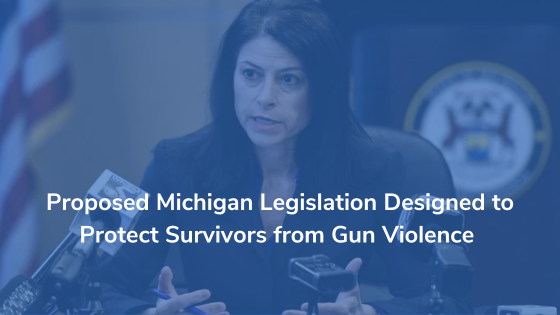Proposed Michigan Legislation is Designed to Protect Survivors from Gun Violence
Written by Carole Chee, Resilience Prevention Intern
“A victim or survivor of interpersonal violence is five times more likely to die when an abusive partner has access to a gun,” stated Attorney General Dana Nessel on September 14 at a hearing of the MI Senate’s Civil Rights, Judiciary, and Public Safety Committee in Lansing. Nessel was referring to a 2003 study published in the American Journal of Public Health, and these statistics rang especially true because of the legislation being discussed at the Michigan Senate.
What is This Legislation?
The committee, chaired by Senator Stephanie Chang, was considering proposed MI Senate Bills 471 and 472. This legislation would prohibit a person convicted of a misdemeanor involving DV from possessing, using, transporting, selling, purchasing, carrying, shipping, receiving, or distributing a firearm or ammunition in this state until the expiration of 8 years after all the following conditions:
- The person has paid all fines imposed for the violation.
- The person has served all terms of imprisonment imposed for the violation.
- The person has successfully completed all conditions of probation or parole imposed by the violation.
If approved, these bills would join landmark legislation like Michigan’s Extreme Risk Protection Order (ERPO) Act, which recently went into effect. ERPO, also known as a “red flag law,” helps families and law enforcement prevent gun violence by temporarily restricting weapon access for individuals determined to be at an elevated risk of harming themselves or others. Alongside ERPO, MI Senate Bills 471 and 472 would help prevent gun violence and save lives.
Connection to Resilience
Senator Chang joined Resilience’s Survivor Advisory Council (SAC) on September 11th to share more about this proposed legislation and spoke with survivors on the SAC about supporting the bills and how we could contact our state legislators about the bills.
Members of the Resilience team then attended the September 14th committee hearing, and on September 19th, Resilience survivors spoke at a Grand Rapids “Day of Action.” Joining other domestic violence prevention advocates, violence survivors, faith leaders and lawmakers, survivor Gabby Dunai advocated for the passage of MI Senate Bills 471 and 472. “I didn’t want my son to ever witness a gun being held to the temple of his mother’s head, both my son and I holding our breath waiting,” she said. “Would this be the last time I look into my son’s eyes and his into mine?”
Legislation History & Importance
Senator Chang explained that these bills, which address “a critical issue in Michigan,” have been in the works now for many years. She has worked alongside domestic violence experts in Michigan to “develop and refine this legislation,” and emphasized to the committee that this has been a bipartisan project.
Additionally, these bills will bring MI legislation closer to federal restrictions/legislation on gun safety laws. To explain why legislation is needed on a state level, Chang said:
Although we do have a federal law in place, we need to give our state-level prosecutors and law enforcement [who have long expressed the need for state legislation and support on this topic] the tools to be able to enforce this kind of prohibition. Right now, we have nothing in the books here in MI state law to help ensure that we are protecting DV survivors from those who are convicted of misdemeanor/DV.
Perspectives
Present and testifying at the committee hearing were representatives from Moms Demand Action and Students Demand Action, each of which shared their heartbreaking experiences with gun violence. MI State Trooper Kristina Droste also testified, sharing from her expertise in domestic violence legislation, action, academy training, and manual-creation. “This is not a gun bill,” she proclaimed. “This is a domestic violence bill, a victim bill. It’s not political, it’s not about guns, and it’s not partisan. We’re talking about people who have been convicted of a crime involving domestic violence.” Droste went on to emphasize that the MI Senate Bills would not impact individuals in the case of allegation or presumed guilt, but rather in cases with “proof beyond a reasonable doubt [the perpetrator] committed that crime.”
Also testifying were Michigan Attorney General Dana Nessel, representatives of the Wayne County Prosecutor’s Office, and Staff Attorney Heath Lowry from the MI Coalition to End Domestic and Sexual Violence. Each one explained the heavy need for these proposed bills to address the homicide and domestic violence rates in Michigan.
A few objections, namely from Sen. Jim Runestad (R-23rd District) and Michigan Open Carry director Tom Lambert, called into question the constitutional efficacy of MI Senate Bills 471 and 472. Staff Attorney Heath Lowry maintained that the proposed legislation contains added layers of protections to meet those concerns about who exactly is being prevented from buying guns.
Now What?
As the Michigan legislative branch continues conversations and actions on these bills, stay tuned for updates on these bills. Meanwhile, contact your representatives – who you can find at https://www.house.mi.gov/ – and urge them to consider the necessity for this legislation to be passed. Critical to the issue of gun violence, interpersonal violence, domestic violence, and abuse are the perspectives and lived experiences of survivors; this Domestic Violence Awareness Month (DVAM), educate yourself on the stories of survivors and push your representatives to do so as well. To learn more about Michigan Senate Bills 471 and 472 or the Extreme Risk Protection Order (ERPO) Act, please visit the sources listed below.
Resources consulted:
- https://senatedems.com/chang/
- J.C. Campbell, et al., “Risk Factors for Femicide in Abusive Relationships: Results from a Multisite Case Control Study,” American Journal of Public Health 93, no.7 (2003): 1089–1097.
- https://cloud.castus.tv/vod/misenate/video/65034392c2596c00087fcdde?page=HOME
- https://www.michigan.gov/ag/news/press-releases/2023/05/19/ag-nessel-joins-coalition-supporting-federal-restriction-prohibiting-handgun-sales
- https://www.michigan.gov/ag/news/press-releases/2023/03/02/attorney-general-dana-nessel-testifies-in-support-of-gun-safety-legislation
- https://www.michigan.gov/whitmer/news/press-releases/2023/05/22/whitmer-signs-extreme-risk-protection-order-legislation-to-keep-michigan-communities-safe
- https://gunresponsibility.org/solution/erpo/
- https://www.wzzm13.com/article/news/politics/advocates-lawmakers-passage-firearms-guns-bills-convicted-domestic-violence-abuse-michigan-legislature/69-5ff31290-6633-418c-96c5-4b85a459b478?fbclid=IwAR3hbX3kOI7GyPvBJCjzlJiEsBo5tdtDRPU9MVzg4ikRRK7Nne5mfxnsm5c
